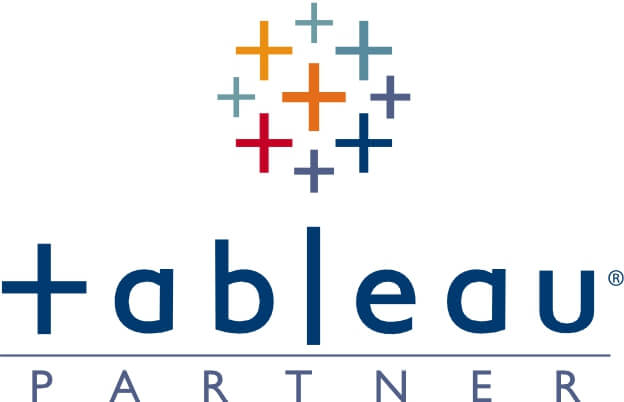
Tableau’s Partner Program
Onware is proud to be a Microsoft, as well as a Tableau partner. These partnerships emphasize our capabilities and skills with Microsoft and Tableau’s products and services and building data cultures. While we value both partnerships equally; in this blog post, we want to specifically mention our Tableau Partnership because 2021 marks our 10th anniversary!
The Tableau Partner Program launched in 2011 and we have been there since its inception. Tableau holds us at high standards. We require a certain level of capacity, capability, skill and commitment in order to bring success to you – our customers, clients, partners and friends.
Coincidentally, the 10th year anniversary also means a new Partner Program – meaning Tableau will rely more on us to help develop your organization’s data culture. In an interview about the new Partner Program, Tableau’s (now-former) CEO, Adam Selipsky emphasized that “it’s all about building the data culture…[because] many of our customers will not get there, [or] don’t know how to get there. We will not get those data cultures implemented [by] many of our customers without effective relationships with partners.”
Data Cultures
What does Adam Selipsky mean by “data cultures”? According to Wikipedia, a data (or data-driven) culture is the principle instilled in organizations requiring focus on making informed decisions based on data rather than experience.
Data-driven cultures have been around for a long time. The Hollywood hit, Moneyball, is an inspiring story about MLB’s Oakland A’s focus on analytics. It was released in 2011, but the book it was based on, was published in 2003. Today, in every professional sport there are plenty of examples of data-driven organizations. Furthermore, this is not limited to sports. If you look around: mobile ads and posts you see on social media platforms like Instagram or Tik Tok, Netflix recommendations, the car you drive, and even the new types of flavoured soda are all driven by data!
Why it is important to create Data Cultures
COVID-19 created a significant wave of unprecedented change and disruption to organizations of all sizes. As a result, it required adaptation with a trend towards becoming digital-first. Now, we are in the midst of an accelerated digital and data revolution. The data collected moves to the forefront (if not already) in influencing an organization’s decision-making.
Over the years, organizations have amassed massive amounts of data. They have longed for better performance, efficient operations, improved customer satisfaction and retention, risk mitigation, and finding blue ocean strategies. As a result, they have invested heavily on market leading analytical tools, as well as talent to match.
However, many underestimate the difficulties in establishing a data culture. The results range from companies and their people doing amazing things like making every fundamental business decision based on data, to those failing to even cope with the basics, leading them to question the return on investment on data initiatives. McKinsey Analytics, a global consulting firm, estimates companies have invested trillions into data analytics. However, only 8% have successfully implemented analytics at scale.
Our experience indicates the reason for unsuccessful analytics initiatives are due to a misalignment in data strategies within an organization. Many revert to the tools that they are most familiar with in the past (e.g. Microsoft Excel) to slice and dice the data to see exactly what they are expecting. Others do not have the patience or trust with data.
We believe there must be an energetic passion for data that pulses through the entire organization. We believe the analytical technologies available today are almost magical and it is only going to get better. Think about the potential if there is a data hungry culture that drives it.
Creating a Data Culture
For organizations both large and small, the data revolution means that building a data culture is more important than ever. Data cultures are not new phenomenons; the idea has been around for long time, so why is there so much trouble implementing it?
McKinsey Analytics surveyed business that have successfully scaled analytics and came up with a conclusion that we agree with:
“You can’t import data culture and you can’t impose it. Most of all, you can’t segregate it. You develop a data culture by moving beyond specialists and skunkworks, with the goal of achieving deep business engagement, creating employee pull, and cultivating a sense of purpose, so that data can support your operations instead of the other way around.”
This supports our experience, and data by itself does not bring much value. It is important to remember that it requires the collective buy-in throughout the organization. Furthermore, they all must understand that the foundation of collecting, analyzing and sharing data is to help make better decisions.
Data Cultures start from the Top
To do this, it must start from the top – organizations follow the leaders. As a result, there must be commitment and constant communication to the organization to have conversations about data initiatives. This includes democratizing data and getting people in front of it to build excitement and experience. Companies like Microsoft or Tableau provide analytical tools that help people (of all skill levels) perform sophisticated analysis at a few clicks or by dragging and dropping.
Data initiatives must be implemented in a responsible manner into key processes and interactions. It is not about throwing analytics at everything and seeing what sticks. It may require an organizational transformation; however it relies heavily on resources already inside that help bridge the gap between data and front-line operations. The investment in technological tools will be more successful when your company becomes data driven.
Partner with Onware to help build your Data Culture
At Onware we have over 20 years of experience working with data – especially with architectural, construction owners, general contractors, engineering, government entities, and service providers – across North America. Thus, we know the difficulties with data and building a data culture.
In our experience, businesses operate with different technology silos. Therefore, data is stored differently in each one. This creates challenges with consolidating data to create a single source of truth. If it takes too long to generate meaningful insights or leads to conflicting ones, it can result in poor decision-making. Consequently, impacting trust in data throughout the organization and creating a barrier for data-driven organizations.
We are committed to partnering with you to help build your data-driven culture. It does not matter where you are in your analytics journey. Our years of experience working across industries provides insights and lessons that will help guide your organization. We know that businesses may be similar, but they are never the same. As a result, we tailor solutions that fit your constantly evolving needs. We are one huge dream team: focusing on unleashing your full potential and igniting (or reigniting) your passion for data. We can help your organization experience a powerful transformation and find new opportunities to innovate together and evolve. Whether it is choosing market leading tools for business intelligence, like Power BI or Tableau, or another solution that fits your organization – we want to help ensure your success by helping you build a data culture, so you can see and understand your data.
Partner with Onware to help build your Data Culture
At Onware, we continually invest in our people, processes and proven technologies in order to bring focused, refined and fully tailored solutions for your Business Intelligence and Analytics strategy. We will help guide you from the beginning to the end. With innovation and insight driven by your feedback, we view our customers as partners, working together—so we can continue to solve real business problems and gain meaningful insights.
Lastly, as Tableau recognizes us as a partner, we want to recognize you – our customers, clients, partners, and friends. Thank you for trusting Onware, we would not be here without you. For our potential new clients, we cannot wait to get started!


